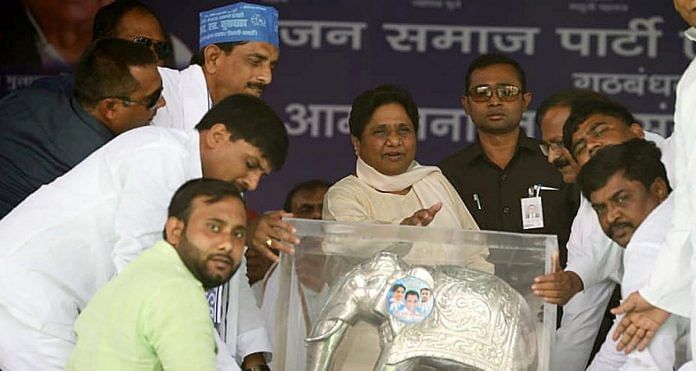Hindi
24 June, 2019: Dainik Jagran talks about the escalating tension between Iran and the US. It says efforts are needed to reduce tensions, but this will happen only when the US and Iran change their attitude — at the moment both the countries are on collision course. It says the Trump administration didn’t do the right thing by withdrawing from the 2015 nuclear pact with Iran, but that didn’t mean Iran should now be moving towards producing nuclear weapons. The international community wouldn’t like to see a nuclear-armed Iran nor West Asia on a boil because of American grand-standing.
Amar Ujala also discusses the tensions in the Persian Gulf. It says India is watching the developments with bated breath as they will have an impact on its economy. Also, around 80 lakh Indians reside in the Gulf and any heightened tension will impact them.
25 June: Amar Ujala talks about the fate of ‘mahagathbandhan’ in Uttar Pradesh. It says Mayawati has cut off her alliance with Samajwadi Party, but she hasn’t come up with any effective ideological path for her party, Bahujan Samaj Party (BSP), to take. Instead, she has given high posts to her brother and nephew, and indicated that the BSP is no different from the rest of the regional parties where one family rules the roost. The sorry state of these regional parties is because they have all become family-held. It also shows that leaders who make alliances in air conditioned offices are often rejected by workers on the ground.
26 June: Dainik Jagran talks of mob violence in Jharkhand and the lynching of Shamim Tabrez, who was allegedly forced to chant “Jai Shri Ram”. These incidents are ominous signs — they show us that the rule of law is not being respected. The government must undertake police reforms. Also, one should not look at these incidents through the prism of minority-majority. The lassi seller in Mathura who was a victim of mob lynching deserves the same justice as Tabrez from Jharkhand.
Amar Ujala calls the report by the US on religious freedom in India intemperate and an interference in the internal matters of the country. India is listed as one of the 16 nations where religious freedom is in danger, according to the report. It is true that incidents in the name of cow protection and religion have increased in recent years and the court had to interfere. These incidents give India a bad image globally and we need to tackle them, it says.
27 June: Amar Ujala talks of “dabango ka dussahas”, the impunity with which musclemen and rowdies commit crimes in Uttar Pradesh. It refers to an incident in Bulandshahr in which a Dalit girl objected to being teased and then some men drove a vehicle over her family members killing two women. This shows that there is no fear of law and that Dalits aren’t safe in the state. The incident happened just a few days after CM Adityanath reviewed the law and order situation and promised that his administration will see to it that crimes against Dalits, women and minorities don’t take place. UP is known for its bad law and order situation and must do something to improve it, it writes.
Tamil
24 June: Dinamani writes on child nutrition and healthcare in the context of Muzaffarpur deaths. Citing the schemes in southern states and DASTAK campaign against acute encephalitis in UP, it says, “Even now 44% of the children under the age of five are malnourished and underweight.” The biggest irony is India boasting of being the world’s fourth-largest economy “while there are unhealthy children in the country”.
The Hindu Tamil is against ‘one nation one election’. The prime issue is that the representative democracy and federal structure will be affected by such a move. So, it is better for the government “to keep this issue aside. Currently, there are many important issues facing people and the government should now focus on them”.
25 June: The Hindu Tamil writes on the recent frictions in the India-US relations. It says trade relations can only be conducted on the basis of mutual benefit. India should not give in to any pressure from the US. At the same time, the friction between the two needs to end “for which we need to resort to talking immediately”.
26 June: Dinamani’s editorial comments on the letters written by Chief Justice of India Ranjan Gogoi to Prime Minister Narendra Modi on tackling pending cases by increasing the strength of the judiciary along with the involvement of retired judges. It says the idea cannot be faulted. But, with “no clear guidelines and formulations for the process, it raises doubts of providing post-retirement benefit to judges rather than the intention of solving cases.” Recommendations from Gogoi should be discussed and debated inside and outside Parliament, it suggests.
27 June: Dinamani takes a critical look at Mayawati’s BSP after the appointment of her brother Anand Kumar as the party’s national vice president. The party, started by Kanshi Ram for the upliftment of Dalits, has now become a family party of Mayawati, it says.
The Hindu Tamil also considers dynasties in relation to the Telugu Desam Party (TDP). It says with a diluted ideology, regional parties are avoiding nurturing of second rung leaders and opting for dynasty politics instead. “When these dynasties fail to capitalise on the headstart, the party disintegrates during testing times,” it writes. Former Andhra Pradesh chief minister Chandrababu Naidu’s attempts to bring in his son into politics didn’t work and this is the reason behind the party’s poor status, it says.
28 June: Dinamani’s editorial is on mob lynchings. It cites the recent Jharkhand incident and says there is no need of a new law as existing laws are adequate. The government needs to take tough action immediately against the accused and the lax police officers. It goes on to say that “PM Modi just condemning the lynching won’t suffice”.



